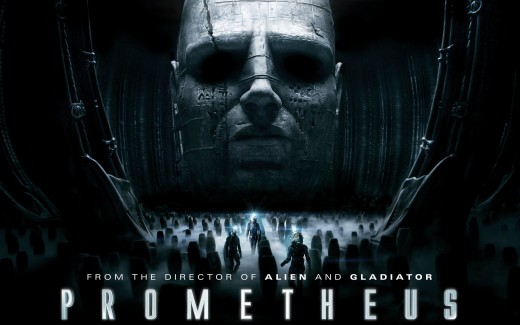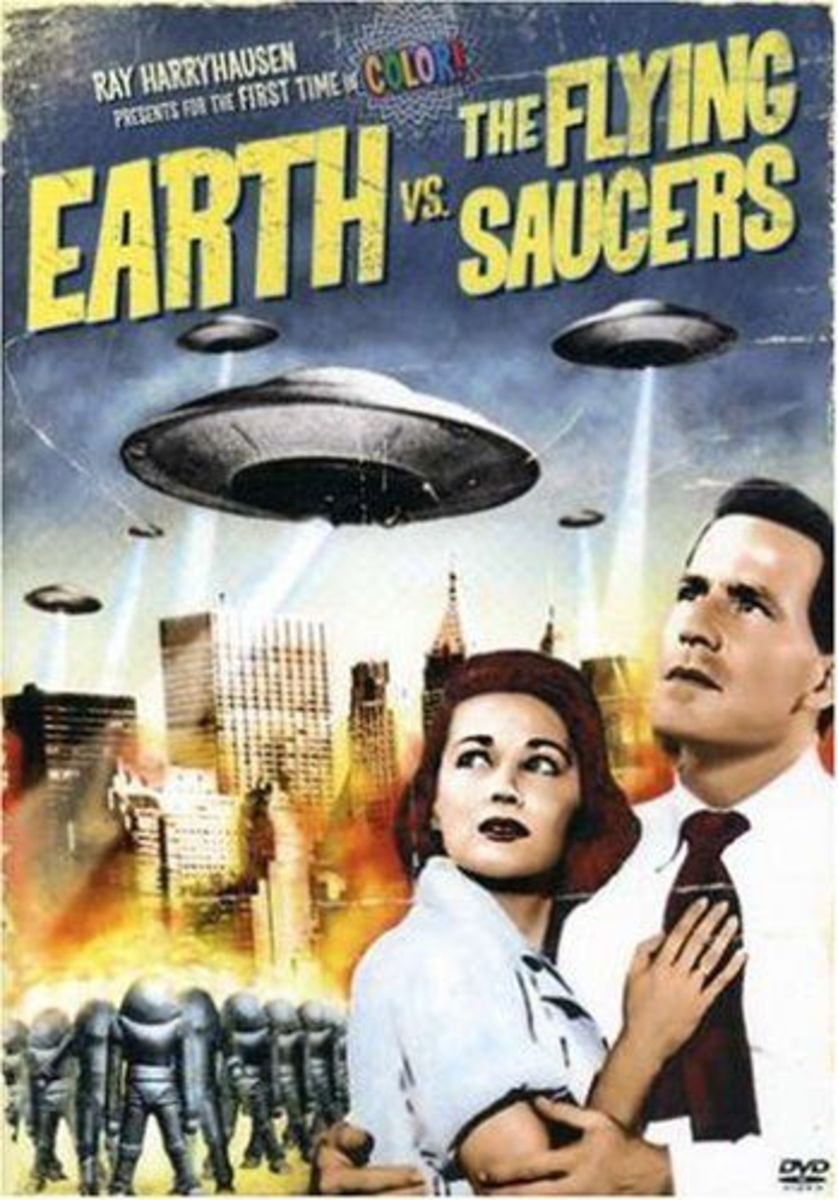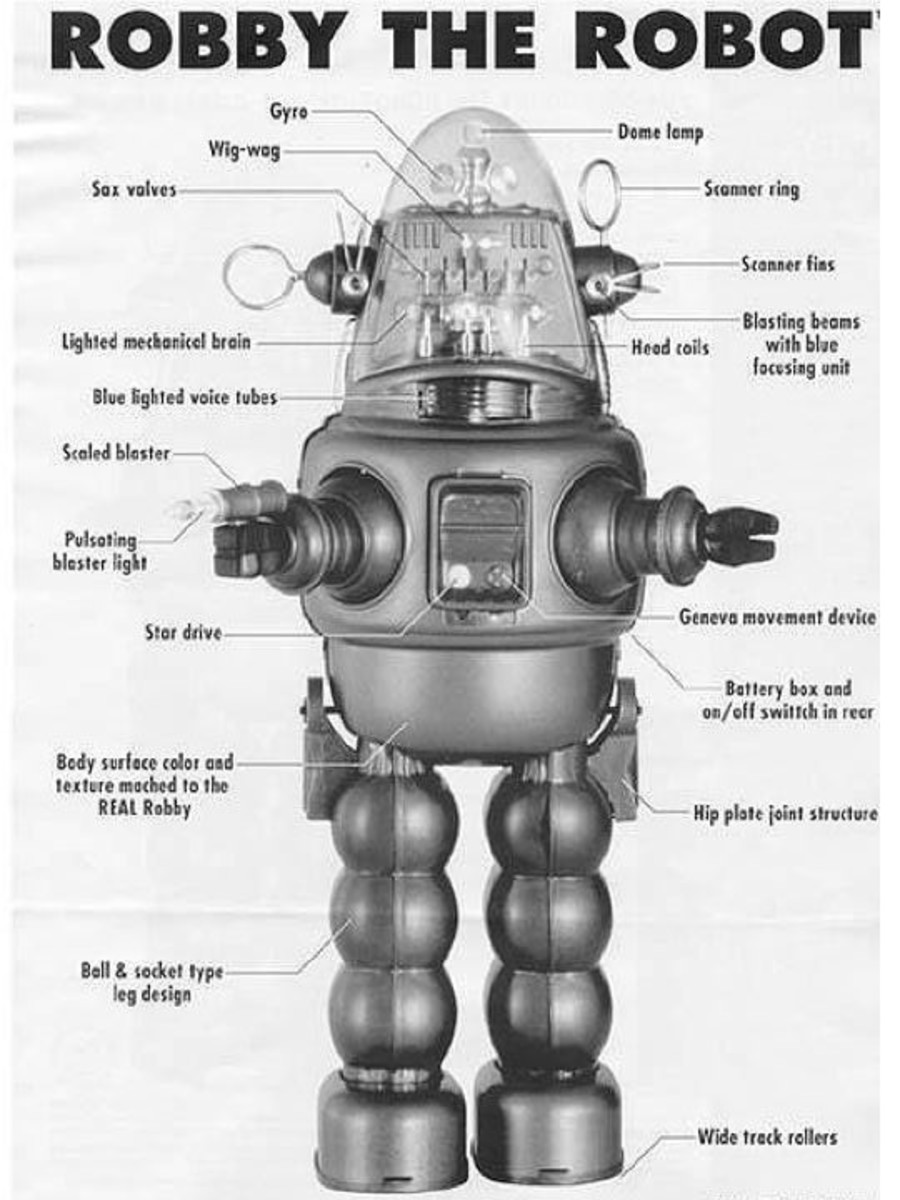The Anxiety of Alien Influence: Ridley Scott's Prometheus

Another empty Hollywood sequel/prequel
I saw Prometheus on Friday, and at the behest of a friend I decided to do a write up of what I took away from the film. Let me start by saying that I didn’t hate the movie, but I really wouldn’t say that I liked it either. Half way through I found myself growing both confused and incredulous with some of the events. There appeared to be some glaring holes in the plot that either were edited out on the cutting room floor or were simply left out of what is somewhat of a sloppy script. The visuals are convincing (as with pretty much every big budget sci-fi/action flick that’s come out in the past ten years) but the character development is nil.
Almost every core sci-fi trope that’s been popularized over the past 100+ years of the genre is used to some extent in Prometheus; present on the roll-call are the cybernetic android that is human in all but flesh and soul, the young scientist(s) with a personal stake in finding answers to pertinent questions about humanity and outer space, mysterious allusions to solving the origin of the human race through myth, super powerful/intelligent alien beings that may or may not be malevolent, an aging corporate mogul hell-bent on figuring out the secrets of existence (a nearly unrecognizable Guy Pearce in a silly old-suit that surely registers as the film’s dumbest moment)…so you get the idea, the film borrows a lot and hints at even more, but delivers little in the way of answers or actual plot payoff. Michael Fassbender plays the android who is some kind of a cross between the intelligent but emotionless Data of Star Trek the Next Generation and the ambiguous HAL of 2001 fame. Noomi Rapace takes over the central female role, which at times appears to be a little too similar to Officer Ripley from the original Alien trilogy. Charlize Theron and Idris Elba (my man Stringer Bell from HBO’s The Wire) are thrown in for good measure as mission leaders but figure little in the actual plot. As you might guess with so many underdeveloped characters and themes, it gets a little confusing at several points.
In addition, the screenwriters borrow halfheartedly from Zecheria Sitchin and Erich Von Daniken’s work on the ancient alien origins of the human race in what ends up feeling like a History Channel/For Dummies…treatment of the subject. To some people these may be cutting edge theories, but they’ve been popular since at least the 70s when both authors’ books (The Twelfth Planet and Chariots of the Gods respectively) gained notoriety for being both titillating but somewhat plausible. Basically, in the world of these speculative historical writers, humanity was created by another race of super-beings, sometimes referred to as the Nephilim, whose traces can be seen all through Sumerian, Egyptian, Babylonian and even Hebrew text and culture. (It’s worth noting that these beings are mentioned in the Old Testament several times by name, but have often been interpreted by scholars as being giant angels that coexisted with man at some point. Go figure!) In Sitchin’s interpretation, the Annunaki/Nephilim (sometimes spelled nefilim) flee from Earth after mining all the gold they can, eventually dooming humanity to extinction in the form of a flood. Similarly in Prometheus the “Engineers,” a group of large and bald humanoid creatures with the same DNA as man, flee the Earth and plan on destroying humanity by sending the aliens from the original trilogy (and the three following films) after us. Interestingly enough, Rapace’s character opines at one point a singular line that appears to be taken directly from the closing remarks of Sitchin’s Twelfth Planet when she wonders aloud if the Engineers created man, who created the Engineers?
I’ll confess that the sci-fi genre is one that is often very self referential and highly derivative of its antecedents. If you employ a lifelike robot or android in your film, you most likely owe a significant debt to Isaac Asimov and his robot novels that included the three laws of robotics (Asimov himself is said to have coined the term “robotic” in the 1940s), just as if you write of strange alien civilizations coming into contact with man, you might be borrowing from Arthur C. Clarke or Ray Bradbury. That’s not even mentioning the host of popular sci-fi films that have come to define the genre (E.T., Close Encounters of the Third Kind, Metropolis, Star Wars, Star Trek, 2001 etc.) and which are often directly or indirectly responsible for much of the schlock turned out by Hollywood these days. However, modern sci-fi films like Sunshine, Gattaca and District 9 succeed where copycat material fails, by adapting older ideas with aplomb and never trading plot or character development for special effects (Damn you George Lucas, damn you!). We get none of that here in Ridley Scott’s latest film.
Does this film suck?

It’s never clear what the situation really is between the namesake aliens from the older films and the Engineers, although both have lain dormant on a distant moon until the ship Prometheus comes from Earth. We never learn whether the Engineers created the aliens solely to wipe out humanity or whether they simply stumbled upon them, but either way it’s implied the aliens got out of hand and destroyed most of the Engineers present on this world. Once Prometheus does arrive, all are reawakened by the unsuspecting earthlings and we get a few scenes of the nascent aliens doing their face-sucking thing. Largely jettisoned, however, are the horror/suspense elements that were so convincing and effective in Alien and Aliens.
The main issue here seems to be that this film doesn’t know what it is or what it wants to be, which is a criticism you could lay on the screen writers as much as the director. Is or isn’t this film a prequel to the Alien franchise that Ridley Scott began in the late 70s/early 80s? Well, it is and it isn’t. Is it more of a hard sci-fi flick that attempts to raise important questions about our own reality? Well, it wants to be at times but it never really succeeds at doing so. Hinting at deeper material (that is mostly borrowed from other sources) does not make this film or any other film profound in any sense in the same manner that Biodome was not a treatise on the green movement simply because it showed an awareness of the actual biodome. Prometheus’s treatment of complex issues of human origin and spirituality is not as ham-handed as when Michael Bay attempted to deal with race relations in Transformers II or when James Cameron attempted to champion environmentalism in Avatar, but it would be a close second in my book.
Prometheus fails mostly because it isn’t based in reality and doesn’t pose relevant questions that reverberate outside of the world of the film. Instead, we’re presented with a second rate reality based on a previous series that is still churning out sequels because the studio recognized a cash-cow when it saw one. In other words, we’re dealing with something similar to the Star Wars prequels/J.J.Abrams school of work: slick, special effects laden film making that relies more on flash than traditional story elements and unabashedly borrows from wherever it can. To quote Randy Quaid from Independence Day (a scene that coincidentally is echoed in this film when Idris Elba’s character pulls a kamikaze with the Prometheus), "All right, you [Hollywood] assholes! In the words of my generation, UP YOURS!"





